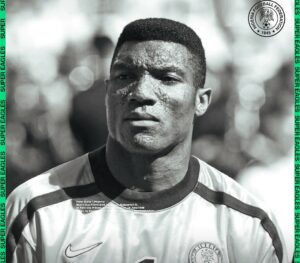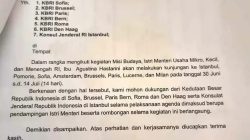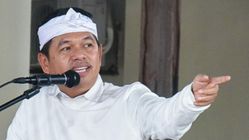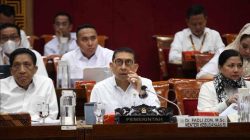As Nigerian football is reeling from the devastating loss of one of its most beloved icons, Peter Rufai, ABIODUN ADEWALE writes on the legacy and unfinished business of the legendary goalkeeper
Regardless
of the generation of Nigerian football you followed, you might have heard of or referred to Peter Rufai as ‘Keeper Rufai’.
The replacement of his first name, Peter, with the word keeper speaks volumes about how synonymous his skills were with the art of goalkeeping. That is even aside from the nickname ‘Dodo Mayana’ – which he earned because of his incredible agility, diving and stretching for seemingly impossible saves.
According to him, goalkeepers even do more than that.
“One thing I remember with fondness now during my time with the Super Eagles would be when I would shout to my attackers upfront,” the late goalkeeper told PUNCH Newspapers during an interview in October 2024.
“You would have about 40 to 50 meters between you, but I would still have to scream to Samson Siasia and co., calling them into positions. This is probably a part of goalkeeping that most people don’t know.”
He was also nicknamed ‘The Flying Cat’ by the legendary Nigerian football commentator Ernest Okonkwo. Even after retirement, his guise still struck a vivid picture of the man who would leap, stretch and calm tensed fans by juggling and even dancing between the sticks.
But all that is no more. Rufai, the legendary former Super Eagles goalkeeper, died in Lagos on Thursday, July 3, aged 61, following a brief illness, and Nigerian football is still reeling from the devastating loss of one of its most beloved icons.
Early years and rise to prominence
Born on August 24, 1963, Rufai hails from Idimu in the Alimosho Local Government Area of Lagos State. His father was fondly called Baba Liberty by all and sundry in Idimu, and his uncle was Oba Saula Rufai, the late monarch of Idimu.
After a few years in Lagos, Rufai moved to Kaduna and Port Harcourt with his mother. It is safe to say he began to piece his passion for football together in Kaduna, but his career took off professionally when he returned to Lagos to team up with Stationery Stores.
As a teenager, Rufai caught the attention of the country during the 1980 FA Cup final between Stationery Stores and Bendel Insurance. Though the latter won courtesy of a lone penalty goal scored by former Super Falcons coach Sam Okpodu, they got banned, and Stationery Stores got the chance to represent Nigeria in the 1981 Cup Winners Cup – meaning another chance for Rufai to shine.
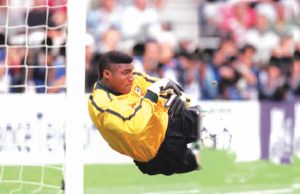
He helped the team reach the final against Union Douala of Cameroon. Rufai was magnificent in the first leg in Douala, saving a penalty as Stores held on for a goalless draw. Unfortunately, he was stretchered off in the early stages of the second leg in Lagos after a collision that led to the lone goal, which sealed the win for the Cameroonian club.
That same year, in 1981, Rufai made his debut for the Nigerian national team, then known as the Green Eagles, in a friendly match. What followed was a remarkable international career that spanned nearly two decades.
AFCON glory and World Cup appearances
Rufai became a consistent figure in Nigeria’s goalkeeping unit during the 1980s, featuring at the 1984 and 1988 AFCON, where Nigeria finished as runners-up on both occasions. But it was the 1994 edition of the tournament in Tunisia that immortalised him.
As the first-choice goalkeeper, Rufai played a pivotal role in Nigeria’s triumph, keeping clean sheets against Gabon, Egypt and Zaire as well as making vital saves en route to Nigeria’s second continental title.
One such save was a penalty save in the semi-final against holders Ivory Coast. He denied Armani Yao before the late Rashidi Yekini powered home the winning penalty to send Nigeria into the final.
In the final, with Nigeria coming from behind to lead Zambia 2-1, Rufai came to the fore, making three astonishing saves to deny Malitoli and Kalusha Bwalya in the closing moments to ensure that Nigeria won that second title.
That same year, he led the Super Eagles as they made their debut at the FIFA World Cup in the United States. The team shocked the world by topping a group that included Argentina and Bulgaria and progressed to the round of 16, with Rufai standing tall in goal.
“It is down in the history books that Yekini scored Nigeria’s first goal at a FIFA World Cup. Daniel Amokachi and Emmanuel Amuneke followed up with more goals as Nigeria routed Bulgaria 3-0. However, before Yekini’s goal, the very jittery Nigerian team had been kept in the game by two excellent saves by Rufai from efforts by Emil Kostadinov,” Nigerian veteran journalist Calvin Onwuka wrote in a sports memo about Rufai.
“Had Bulgaria scored first, the course of history could have been altered. Nigeria was to lose to Italy in the second round and exit the tournament, but Rufai had been as good as any Nigerian who played a minute in the tournament.”
Club career across Europe
Rufai’s exploits weren’t limited to the national team. He had a colourful club career that saw him play in Belgium, the Netherlands, Spain, and Portugal. He had stints with Lokeren and Beveren in Belgium before moving to the Netherlands to play for Go Ahead Eagles. He later featured for top Spanish side Deportivo La Coruna and also played for Hercules. In Portugal, he kept the goal for Farense and Gil Vicente.
Wherever he went, Rufai left a trail of admiration — not just for his talent, but for his humility and professionalism.
Perhaps that is why he stayed for years in his base in Europe, continued to pursue further education, and was a sports administrator in Belgium and the Netherlands until he returned to Nigeria.
A mentor, but not Eagles goalkeeper trainer
After retiring from active football, Rufai did not walk away from the sport he loved. He devoted his post-playing years to mentoring young goalkeepers and grassroots players by setting up Staruf Academy.
His vision was always centred on giving back — a value he never failed to uphold. Whether it was through youth initiatives or coaching clinics, Rufai worked to ensure that his wealth of experience benefited the next generation.
However, he did not serve as the goalkeeper trainer of the Super Eagles, a strange non-accomplishment of the legendary goalkeeper.
“It’s an international loss. He was a little bit ahead of us, and honestly, he was number one. Peter is somebody whose confidence and command of the goalpost is one of the best I have ever seen. Working with him enabled me to see how hardworking he is and how thorough he was about his game,” former Super Eagles goalkeeper Alloy Agu told our correspondent.
“He worked with the Olympic team as part of the officials. We worked together then. Honestly speaking, it was his choice not to serve as the national team goalkeeper’s coach. But he did work with the Olympic team at some point,” Agu added.
“He didn’t really want to get into the politics of the NFF. He was reserved and didn’t mingle too much. He had his own academy and business, so he just wanted to focus on that,” a close source to the late goalkeeper also told our correspondent.
Rufai’s unfulfilled dreams
If it was Rufai’s choice not to serve as the goalkeeper trainer of the Super Eagles, he also had other aspirations which he didn’t bring to life before his death.
One of his long-standing wishes was to have a mini sports complex in Idimu, but that idea never saw the light of day due to the inability to secure a suitable piece of land for the project.
One of the indigenes of Idimu and a former council supervisor, Akeem Abogunloko, revealed the efforts that were made to help Rufai actualise the dream.
“There was a time when I was at the local government as supervisor for health, he came with his team and told us about his vision for Idimu and Alimosho as a whole. It was about building a mini-stadium. He was also in the palace,” Abogunloko said.
“We couldn’t get him the land, and he found another land in Badagry, but he insisted that he wanted the project in Idimu. Before he died, he still mentioned it. I think the sports centre was even going to be named after the late Oba Rufai.”
The goalkeeper’s cousin, Kehinde Rufai, who also had a short football career as a goalkeeper for clubs in Ghana and Togo, revealed that the community doesn’t have a standard football pitch for aspiring footballers.
“We used to play at the school within the town, but there were complaints about people desecrating the classes and the school environment. So, there has been an order restricting anyone from going there to play football.”
Rufai also has an unpublished book, 3as revealed by former sportscaster and Marketing Communications expert, Modele Sarafa-Yusuf.
“After retirement, he continued to better himself and only in January this year, he graduated from the National Institute for Sports. At that ceremony, he told me about his plans for the launch of a book he had written, and I promised my support. Sadly, he did not live to unveil the book,” Sarafa-Yusuf wrote on Facebook.
A close source to the family also revealed that the book is at the point of publication and might be launched with the burial arrangements.
A legacy of goalkeeping apprenticeship
To become an ex-international of Rufai’s calibre, you must have learned from the best.
When he broke into the Green Eagles in the 1980s, he met Peter Fregene, Best Ogedegbe and Emmanuel Okala, and he drew from the rich legacy of the Nigerian goalkeeping greats.
According to him, it was the late Fregene who usually called him ‘Dodo’ before he added Mayana during their training tour of Portugal.
More than just a footballer, Rufai was a symbol of excellence and national pride. His nickname, Dodo Mayana, encapsulates the flamboyance and showmanship he brought to goalkeeping, but behind the flair was a man of discipline, heart, and humility.
Tributes keep pouring
As news of Rufai’s passing spread, tributes poured in from across the footballing world.
The Nigeria Football Federation NFF, described him as “a giant of Nigerian football” and one of the most iconic players in the country’s history.
“Forever in our hearts, Dodo Mayana,” the NFF wrote on X. “Your legacy lives on between the sticks and beyond. Rest well.”
CAF president Patrice Motsepe also said, “Peter Rufai is part of a special generation of African Football players who made the people of Nigeria and the entire African continent very proud.”
Super Eagles captain Ahmed Musa also offered a heartfelt tribute, “I can’t believe I’m typing this – a post to bid farewell to a true giant of Nigerian football, Peter Rufai. Your heroic reflexes and unwavering presence between the posts brought us moments of pride on the world stage… Fly high, DODO MAYANA — the nation mourns a hero.”
Former Super Eagles goalkeeper Dele Aiyenugba, who looked up to Rufai as a role model, called his death “a personal loss.”
“We lost an icon. I could remember how he made me fall in love with goalkeeping with the way he flew and dived. He was someone I looked up to. May God bless his soul.”
Even outside the football community, national leaders mourned his death.
Provided by SyndiGate Media Inc. (
Syndigate.info
).

